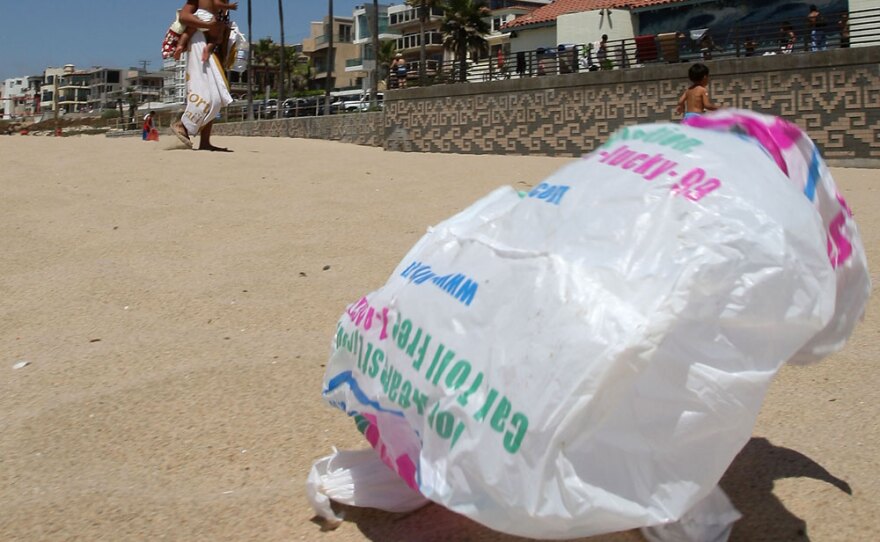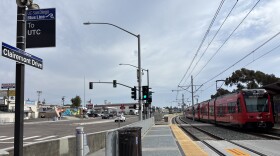Plastic bags may have become victims of their own success. Their very ubiquity -- an estimated 90 billion plastic bags are used in the United States each year -- has led to a small but growing number of jurisdictions discouraging their use through fees or outright bans.
Last week, the California Assembly voted to approve the first statewide ban on both plastic and paper "single-use" bags. Republican Gov. Arnold Schwarzenegger has said he'll sign the bill if it makes it to his desk. The state Senate is expected to act on it by August.
The California proposal follows about a dozen local bans within the state, as well as bans and bag taxes enacted in several other countries, including China, Ireland and Bangladesh.
This past January, Washington, D.C., imposed a 5-cent fee on bags given out by stores that sell food. And last year, the top environmental official with the United Nations called for a worldwide ban on "pointless" single-use plastic bags.
"Of course we have the environmentalists on board, but we also have the grocers, the retailers and the United Food and Commercial Workers union," says Kirsten James, water quality director for Heal the Bay, a Santa Monica-based environmental group that has been a leading proponent of the California ban.
Based On Myth And Misinformation?
Of course, not everyone agrees that dispensing with plastic bags would be wise -- or even necessary. The chemical and plastic industries have long pushed back against bans and bag fees, arguing that plastic bags occupy a relatively small share of space in landfills and that they cost less money and require less energy to produce than paper bags.
Companies and trade groups associated with the manufacture of plastic bags have sponsored several webpages devoted to debunking supposed myths about plastic bags.

Stephen L. Joseph, who is counsel to Save the Plastic Bag Coalition, a San Francisco-based group that gets support from the plastic bag industry, says environmentalists are guilty of promoting their cause through "myth, misinformation and some outright lies."
He says they have willfully misled the public and legislators about the extent of pollution and harm to animals caused by plastic bags. He cites a 2008 article in the Times of London that reported that one widely cited figure -- that 100,000 marine animals are killed annually by plastic bags -- was based on the misinterpretation of a study that didn't even mention plastic bags.
"The Times has established that there is no scientific evidence to show that the bags pose any direct threat to marine mammals," the article concluded.
Are The Skeptics Right?
"In their eagerness to make their case, some of the environmental groups make up claims that are really not supportable," says David Laist, a senior policy and program analyst with the federal Marine Mammal Commission.
But that doesn't mean critics such as Joseph are right that plastic bags don't harm marine animals at all, he says. It's just that it's difficult to document the extent of the problem.
"There's basically no way to go out and do a sample of the number of animals that die as a result of this," he says. "For the most part, they occur scattered all over the ocean and quickly get eaten by predators or sink to the bottom and are never found."
Turtles, apparently, are the hogs of the sea. "They eat everything," he says. "They don't seem to discriminate between plastic bags and jellyfish or anything else."
The fact that animals eat plastic –- even if they don't die by the tens of thousands as a result -- troubles Alfred C. Carr Jr., a Democrat in the Maryland House who has sponsored a bill to impose a Washington, D.C.-style nickel fee on bags. "Plastic bags don't biodegrade," Carr says. "They break into smaller pieces, meaning they'll get into the food chain, which means they get into us."
Ill Effects On Land
Possible effects on marine life and the food chain are not the only motivation driving supporters of bag bans and fees. California state Rep. Julia Brownley, who sponsored the statewide ban legislation, calls the proliferation of bags that billow through neighborhoods "urban tumbleweed."
A plastic bag dancing in the wind may have furnished a poetic ending for the film American Beauty, but in most contexts it would be considered blight. "Especially in low-income areas, they may not have the public works funding to clean these up," says Kirsten James of Heal the Bay.
A 2008 trash survey by the District Department of the Environment found that plastic bags "dominate all other categories" within Washington's Anacostia River watershed.
That study helped prompt the local 5-cent bag fee. The department plans to do a follow-up survey within the next year, but in the meantime merchants are reporting decreases of 50 percent or more in bag usage since the fee took effect, says Charles Allen, chief of staff to Councilman Tommy Wells, sponsor of the fee.
"Anecdotally, we're hearing from many groups that do annual river cleanups that they are seeing a dramatic reduction in the number of plastic bags they are pulling from the river this year," he says.
A Mixed Bag
But for now, Washington stands alone. Last year, Seattle voters rejected a 20-cent fee on plastic bags. Carr's bill in Maryland has yet to gain traction. And recommendations from Florida's Department of Environmental Protection to ban or at least discourage the use of plastic bags have gone nowhere in the legislature.
So far, at least in this country, the campaign against plastic bags amounts to more of a groundswell than a real tide. About a dozen California cities and counties have followed San Francisco's lead since 2007 in passing local bans on bags, but three of the ordinances have been blocked by the Save the Plastic Bag Coalition through court action or legal settlements.
Still, continuing interest in this topic among coastal communities in particular led the California Grocers Association to endorse the proposed statewide ban. "This year, there was so much momentum at the local level that the grocers didn't want to have to face a patchwork policy," Kirsten James says.
James says her group, Heal the Bay, has gotten so many requests for information from other jurisdictions that it has put together a "toolkit" for crafting and promoting legislation elsewhere.
Plastic bag makers may have won some debates in the court of public opinion -- as well as some victories in actual courts -- but if the California Senate approves the ban, momentum may start shifting toward the banners.
"I think a lot of the members of the Senate are going to be taken in by what they're being told by the environmentalists, which is unfortunate," says Stephen Joseph of the Save the Plastic Bag Coalition.
Copyright 2022 NPR. To see more, visit https://www.npr.org. 9(MDAzMjM2NDYzMDEyMzc1Njk5NjAxNzY3OQ001))






